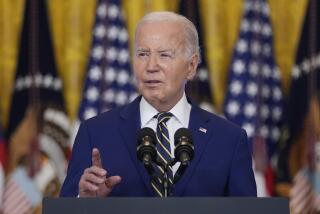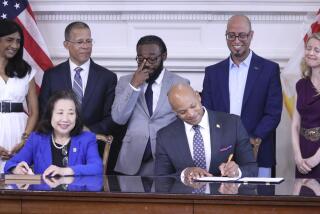Federal Forgiveness Starts Here : U.S. pardon attorney is the first step toward official recognition of rehabilitation. The last, and biggest, hurdle is in Oval Office.
WASHINGTON — You enter the drab office building half-expecting someone to greet you with an “excuse me” or “sorry about that.” The sign on the door, after all, identifies the office as that of the United States pardon attorney.
But the Justice Department official you find there is far from an obsequious “pardon-me” type. Margaret Love, who has held the position for six years, is a blunt-speaking career government lawyer who makes no apologies.
“This program allows ordinary people to reclaim themselves, to get rehabilitated,” she says. “It’s a very helpful program.”
Love usually plays no role in the pardons of celebrated officials--such as former Defense Secretary Caspar W. Weinberger, who was granted clemency by President Bush four years ago from a perjury indictment arising from the Iran-contra scandal.
Nor would she have a hand in any future presidential pardons for Susan McDougal or other figures in the Whitewater land development deal, about which speculation has swirled given President Clinton’s refusal to flatly rule out clemency.
Pardons initiated by the White House customarily are granted by presidents outside the regular procedures established by law. Such pardons--most famously Gerald R. Ford’s clemency for Richard Nixon from any charges in the Watergate scandal--never pass through the pardon attorney’s office. They result from a chief executive acting on his own or from high-level lobbying of the White House by friends of the accused.
Love’s office follows federal regulations, which say a convicted felon is not allowed to be considered for a pardon until he or she has served a full sentence and been out of prison for five years.
It is the right of any convicted felon, great or small, to apply for a pardon. In ordinary cases, the procedure is this: Formal applications are submitted, and after FBI agents interview friends, neighbors and possibly employers of the felons to determine if they have been rehabilitated, Love’s office recommends a yes or no.
The matter then goes to Justice Department superiors in the office of the deputy attorney general. If they agree on a pardon, it is passed on to the White House. Especially of late, far more applications die at this point than are granted.
Applicants are cautioned by Love’s office that “the power to grant pardons is vested in the president alone” and that there is no appeal from an adverse decision. And over the years, the number of pardons has decreased dramatically.
Presidents Truman and Kennedy, for instance, each granted more than 40% of all clemency requests. Ronald Reagan granted 13%, but Bush only 4.2%. So far, Clinton’s rate is 3.7%.
Love would not speculate on why the numbers have decreased. Other legal experts, however, said presidents in recent years have been increasingly disinclined to interject themselves into the criminal justice system, fearing that the political risks outweigh the gains.
Currently 1,300 applications are pending in Love’s office.
Justice Department guidelines say the five-year waiting period “is designed to afford the petitioner a reasonable time in which to demonstrate an ability to lead a responsible, productive and law-abiding life to the betterment of the community.”
If former convicts do that, why do they need a pardon?
“Basically, many applicants are looking for a symbolic affirmation of their reconstructed lives,” Love says. “A pardon is a symbol of forgiveness, not a symbol of innocence.”
Besides a psychological lift, a presidential pardon can sometimes offer career advantages. Love said it might help a person wanting to work as a bank guard, for example, to obtain the necessary gun license he has been denied as a felon, or it might enable a white-collar felon to regain his brokerage license. In some states, a pardon helps restore voting privileges, or the right to hold public office.
Justice Department guidelines caution pardon applicants that “failure to fully and accurately complete the petition form may be construed as falsification,” a crime that could subject them to five more years’ imprisonment.
Although inaccurate statements sometimes are found, Love said no one has yet been convicted of deliberate falsification.
For a pardon-seeker, of course, that would be the ultimate foul-up.
More to Read
Sign up for Essential California
The most important California stories and recommendations in your inbox every morning.
You may occasionally receive promotional content from the Los Angeles Times.










